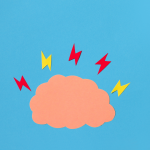
Sleep Must Be a Priority

Nancy A. Palermo MD
Getting quality sleep is foundational for optimal health yet one out of every three Americans is not getting sufficient sleep.
This reduction in sleep quantity and quality is leading to an array of health issues including obesity, diabetes, heart disease, Alzheimer’s, and mental disease.
The conventional approach to sleep issues is a pill but this is not without side effects. Prescription sleep aids are associated with reduced sleep quality and even worse they pose a 5 times greater risk of memory and concentration problems, 2 times increased risk of falls and fractures, and 2 times the great risk of motor vehicle accidents. Long-term use is also associated with parasomnias-abnormal behaviors like sleepwalking, sleep eating, and sleep-driving. Recent data has shown a correlation between long-term use and increased risk of dementia, Alzheimer’s, and cognitive decline. Unfortunately getting off them is not easy either. Discontinuation is associated with withdrawal and rebound insomnia. Dependency can develop after just two weeks of use.
So, while sleeping pills may not be a good option, sleep deprivation is not so good either. Many important things happen when we sleep. In fact, our brains are 30% more active when we sleep.
Our body has a cellular waste and clean-up system called the lymphatic system, yet this does not include the brain. Recently scientists have found the brain has its own clean-up system termed the glymphatic system. It is responsible for the removal of dead cells, by-products, and toxins. This process makes room for new cells and development. It also allows for neurogenesis, the growth of new cells, and nerve connections. Researchers at the University of Rochester Neuromedicine Center found the glymphatic system is 10 times more active when we are asleep.
They found individuals who do not get sufficient sleep have a build-up of dead cells and toxins that can form a substance called amyloid. Amyloid is one of the characteristics found in the brain of Alzheimer’s patients.
This may explain why a reduction in sleep can affect memory, concentration, and ability to accomplish tasks. A study in the Lancet looked at a group of MDs and showed that those who were sleep-deprived took 14% longer to complete tasks (do you really need to wait any longer in the doctor’s office?) and made 20% more errors as compared to those who were well-rested. Teenagers in a Wyoming school system were allowed to start school one hour later. In a study looking at the change in time, these students showed improvement in grades, an increase in attrition or staying in school, improvement in mental health, and most importantly a 70% reduction in motor vehicle accidents during the study period.
During sleep, our immune system is also fortified.
In fact when we sleep gene which regulates the immune cells get activated or turned on. These same genes can get turned off when we do not sleep. Getting less than 7 hours of sleep is associated with three times more likelihood of catching a common cold and getting less than five hours of sleep made developing pneumonia 60% higher. During sleep, we actually ramp up the numbers of T cells and Natural Killer Cells (NK cells ), the first responders to infection. One night without sleep can reduce the NK cell production by 70%. The Humoral Immune System or antibody production is also increased with sleep and decreased when we skimp on sleep. Reducing sleep to 5 hours for 4 days reduced the immune response to the flu vaccination showing a 40% reduction in antibody response.
A great deal of hormone production also occurs during sleep.
Listen up guys (and gals )…most of our testosterone production occurs at night during sleep. Testosterone can affect sex drive, cognitive function, and lean body mass. In men who slept 5 hours or less for 4 days, there was a reduction in testosterone levels to someone ten years older. Certainly, we do not want to skimp on this! Also, our anti-aging hormone, Growth Hormone (GH) is predominantly produced at night. In fact, 70% of GH production occurs while we sleep. Deemed the anti-aging hormone, GH is anabolic and associated with fat burning, improved recovery, increase in lean body mass and increase in bone density. Growth Hormone also increases collagen production so getting ZZZs can improve our skin.
Our cardiovascular system is dependent on quality sleep.
Daylight savings time is a perfect example of how just a couple of hours can wreak havoc on our heart. In the spring when we lose an hour of sleep, there is a 24% increase in the incidence of myocardial infarctions (MIs). In the fall when we gain an hour there is a 21% decrease in MIs. That is remarkable.
A prospective Harvard study following individuals who slept less than 6 hours a night showed a 200% increase in MI’s and heart issues during their lifetime as compared to those who routinely get 7 or more hours of sleep a night. In addition, after the 6-year study, the individuals who regularly got 6 or fewer hours of sleep showed a 200-300% increase in calcification of the coronary artery-the main artery of the heart. These calcifications were not present in these individuals prior to the 6-year study.
If you are not convinced yet that sleep plays an important role in our health, research has shown that lack of sleep is associated with weight gain and blood sugar disruptions. We tend to consume 200-400 extra calories after a poor night’s sleep. We also tend to snack more and look for higher carbohydrate foods when we do.
One study showed that sleeping 5 hours a night for one week led participants to gain 2 lbs in the week without changing diet or other habits. The study out of Stanford showed sleep-deprived individuals had higher levels of leptin, the hormone associated with satiety and appetite regulation. They found that sleeping 5 hours or less for 3 nights showed these increases in Leptin. Sleep can also drive the activity of the amygdala, the area in the brain that drives emotions and drive. Forget willpower when you do not sleep. Lastly, when we do not sleep, we can get elevations of insulin and cortisol. These increases are associated with the addition of body fat and associated inflammation.
Now you know, Sleep is essential for immune health, weight control, blood sugar regulation, and overall psychological and physical health. Good quality sleep has an overarching impact on how we feel and function while awake, so it’s crucial we get enough of it.
Sleep must be a priority as it is a foundation to good health. That is why we are making it a priority with our Sleep Fix program out in 2 weeks. If you are not sleeping this may be the solution you need to optimize your health.



